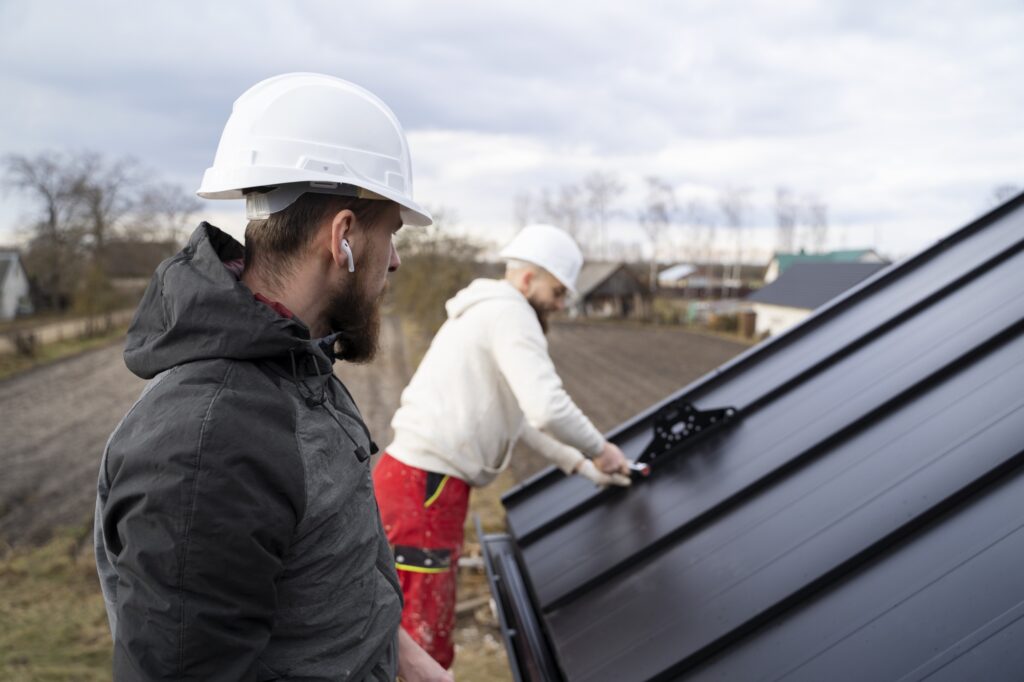Introduction
When it’s time to hire a roofing contractor, knowing what to look for can save you time, money, and stress. A reliable contractor ensures your roof is installed or repaired with precision and care, protecting your home for years to come. In this guide, we’ll provide essential roofing tips to help you choose the right professional, including checking for proper licensing, verifying insurance, and comparing written estimates. These steps will ensure you make an informed decision and receive high-quality roofing services.
How to Hire a Roofing Contractor: Key Factors to Consider

When you need to hire a roofing contractor, it’s crucial to make an informed choice to ensure the success of your roofing project. Start by verifying that the contractor has proper licensing and insurance, which protects you from potential liabilities. Next, ask for references and read online reviews to gauge the contractor’s reputation. It’s also important to get written estimates from multiple contractors to compare costs, materials, and timelines. By following these steps, you’ll be more likely to hire a roofing contractor who is reliable, experienced, and professional.
Check for Proper Licensing and Insurance
Why Licensing Matters
One of the first things to verify when selecting a roofing contractor is whether they have the proper licensing. A licensed contractor meets industry standards and local building codes, ensuring that the work will be done professionally and legally. Hiring an unlicensed contractor could result in subpar workmanship or even fines for non-compliance with regulations.
The Importance of Insurance
Roofing work comes with inherent risks, and the possibility of accidents is always present. That’s why it’s crucial to hire a contractor with adequate insurance, including liability and workers’ compensation. This protects you from being financially responsible for any accidents or damages that may occur during the project.
Look for Local Experience
Advantages of Hiring Local Contractors
Working with a local contractor has several benefits. Local contractors are familiar with the regional climate, building codes, and regulations, which means they know how to tailor roofing solutions to your area. Additionally, they’re more accessible for follow-up work or future maintenance, ensuring your roofing investment is protected.
Checking Reputation in the Community
A well-established local contractor will likely have a solid reputation within the community. Ask for references from friends, neighbors, or local businesses to get a sense of the contractor’s reliability and quality of work. Online reviews can also provide insight into their track record and customer satisfaction.
Check for Warranties and Guarantees
Manufacturer and Workmanship Warranties
Reputable contractors offer warranties that cover both the materials and their workmanship. Material warranties typically come from the manufacturer and protect you from defects, while workmanship warranties cover any installation errors. Make sure you understand the length and coverage of these warranties before signing a contract.
What Guarantees Should Cover
Beyond warranties, a good contractor will also offer guarantees on their work. This typically covers any issues arising from faulty installation, ensuring that you won’t be left with a roof that doesn’t perform as expected. Ask how long the guarantee lasts and what it includes.
Get Written Estimates
Why a Written Estimate is Essential
Always request a detailed written estimate from potential contractors. A thorough estimate should include labor costs, material costs, project timeline, and any additional fees. Written estimates provide transparency and prevent unexpected charges or misunderstandings once the project begins.
Comparing Multiple Estimates
Gathering several estimates is a smart move before committing to a final choice, as it allows you to compare pricing, services, and value. However, don’t automatically choose the lowest bid. Consider the quality of materials, contractor experience, and the details included in each estimate. Sometimes a higher bid may offer better long-term value.
Check Online Reviews and Testimonials
Importance of Customer Reviews
Reading online reviews provides useful insights into a contractor’s dependability and the standard of their work, helping you make a more informed decision. Look for patterns in the feedback. Consistently positive reviews indicate a trustworthy contractor, while recurring complaints may signal red flags.
Seeking Testimonials and Referrals
Ask potential contractors for references from previous clients. Speaking directly with past customers can give you a clearer understanding of the contractor’s strengths and weaknesses. If the contractor is hesitant to provide references, that could be a warning sign.
Inquire About Materials and Techniques
Ensuring Quality Materials
A good roofing contractor will use high-quality materials suited to your home’s needs and local climate. Inquire about the materials they suggest and the reasons behind their recommendations to ensure you understand the benefits and suitability for your project. Ensure they are using reputable brands known for their durability and performance.
Roofing Techniques and Installation
It’s important to understand the contractor’s approach to installation. Ask about their techniques, how they ensure safety, and whether they are up-to-date with the latest roofing technologies and methods. Proper installation is just as crucial as the materials used.
Communication and Professionalism
The Role of Clear Communication
Clear and open communication is crucial for ensuring a smooth and successful roofing project. Your contractor should be transparent about the process, keep you informed about progress, and be available to answer any questions or concerns. If they are difficult to reach or unclear in their explanations, it may indicate poor communication skills.
Signs of Professionalism
Pay attention to how the contractor conducts themselves throughout the consultation process. Are they punctual and respectful? Do they maintain a clean and organized workspace? These are signs of professionalism that reflect the quality of their work.
Verify Contractor Credentials
Checking Certifications and Affiliations
Reputable contractors often hold certifications from recognized roofing organizations, such as the National Roofing Contractors Association (NRCA). These certifications demonstrate that the contractor has received proper training and adheres to established industry standards. Affiliations with professional organizations also demonstrate a commitment to excellence.
Conclusion
Choosing the right roofing contractor is essential for the success of your roofing project. By following these guidelines—checking for licensing, insurance, local experience, warranties, and communication—you can ensure that you’re hiring a professional who will deliver quality work. Take the time to research, compare estimates, and verify credentials before making your decision. This careful selection process will help ensure your roofing project is completed to the highest standards.














